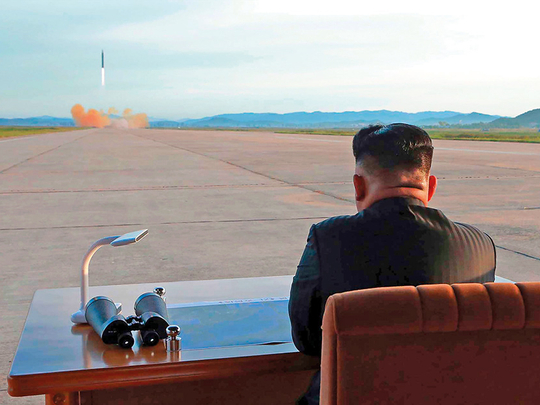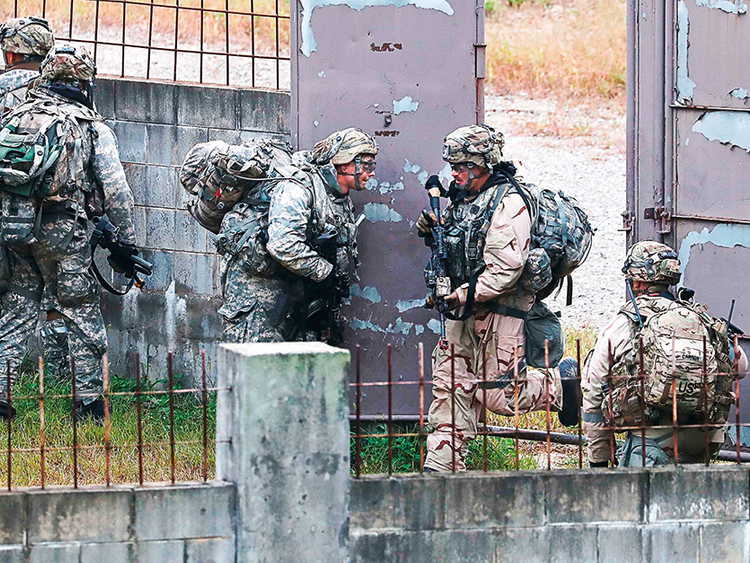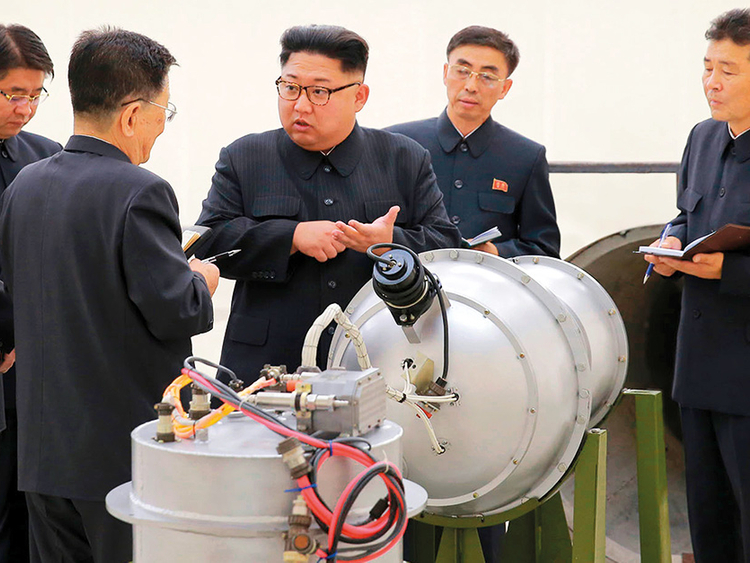
Kuala Lumpur: If words were weapons, right now the United States and North Korea would be engaged in a bloody and decisive ideological battle. So far, despite all the intensive insults and rhetoric, rocket launches and missile tests, the standoff between the Pyongyang regime and its regional adversaries and the US remains just a war or words.
But the situation is tense — and a misstep or unscheduled incident could result in the exchange turning from bombast to bomb blasts, and barbs to bullets.
Any new conflict with North Korea would likely escalate quickly — and the use of nuclear weapons cannot be ruled out.
US President Donald Trump has already threatened to rain “fire and fury” down on Pyongyang and, at the United Nations General Assembly last week threatened to “totally destroy” and erase the country from the map. For his part, North Korea leader Kim Jong-un has threatened to “annihilate” the US with “the toughest counter strike ever seen in history” and has already launched a series of missiles and nuclear bomb tests in recent months to assess his capabilities and flex his regime’s muscles.
There has been an uneasy calm across the De-Militarised Zone (DMZ) since July 1953 when both sides signed a ceasefire after a bloody three-year war that claimed an estimated 4 million lives.
The recent supercharged war of words between Kim and Trump has exacerbated tensions, and the risk of a full-blown military confrontation is closer than at any point over the past six decades.
“The major thing people are talking about is miscalculation — we could easily stumble into something with the rhetoric being so heated,” Philip Yun, a Korea expert who was an Asia adviser under former President Bill Clinton, said.
Yun believes the risks were exacerbated by the “credibility problem” Trump has acquired due to his frequent off-the-cuff remarks that often appear to go counter to the more measured remarks of his officials.
“In nuclear deterrence, credibility is everything and there’s a situation that if no one takes you seriously, you have to do something to make sure you are taken seriously, and that’s where the miscalculation can happen,” Yun said.
Any miscalculation or incident along the DMZ could immediately have untold consequences.
Clearly, North Korea has the capability of making a nuclear bomb. On September 3, it tested a 160-kilotonne device underground that resulted in a 6.0 earthquake that was felt in neighbouring China
A natural earthquake registering 3.0 on the Richter scale on Saturday caused immediate concerns that Pyongyang had tested a smaller device — leaving exactly the footprint analysts suspect would indicate that the bomb is small enough to fit on a ballistic missile. The nature of the tremors before and after the main shakes, however, show it was a natural event. But the tremor also indicates just how jittery nerves are on the peninsula.
Even a conventional clash could cause catastrophic casualties, given the thousands of North Korean artillery pieces ranged along the border, at least 1,000 of which are capable of reaching the densely populated South Korean capital Seoul and its metropolitan area, home to some 25 million people.
“It would be very difficult to eliminate that threat before the artillery fire could create a lot of damage on the southern side,” David Shear, who served as the senior US defence official for east Asia under former president Barack Obama, said.
“I take projections of casualties of thousands to tens of thousands quite seriously and that’s just in South Korea — it’s possible North Korea could attack Japan as well.”
The real danger of any pre-emptive US strikes against North Korea’s weapons sites would be that Pyongyang, whose conventional forces are considered no match for those of the US and its allies, might resort to using its chemical and biological weapons and ultimately its nuclear arsenal.
Then there is the potential for casualties running into the millions.
“If they did launch they could potentially wipe out cities in South Korea and Japan, and in the longer term maybe reach the US West Coast and even further inland,” warned Hans Kristensen, director of the Nuclear Information Programme at the Federation of American Scientists.
Even if everything went right for the Pentagon, a US strike campaign against North Korea would take up to a week to be effective, Kristensen cautioned.
Yun said the catastrophe would not just be human.
“If we had a war, think about what it means. You are talking South Korea, the 11th largest economy in the world, Japan, the third largest economy, and you are talking about ground troops on the Korean peninsula.
“Donald Trump’s agenda would be consumed by this. Nothing else would get done. It’s against his interest and it’s not really an option.”
— With inputs from Reuters














